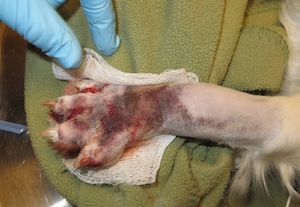By Dr. Danielle Huval, DVM
Emergency Veterinarian
As we all know, this has been a dry and hot summer. One thing that we have seen a lot more of at Animal Emergency and Critical Care is rattlesnake bites. The majority of the bites we see are from the Lyons area but there have also been a few from rural areas as well. Rattlesnakes and the dogs involved are generally both in the wrong place at the wrong time. Acting fast can save your dog a lot of pain and suffering. If you suspect a bite, get your dog to a veterinarian immediately.
 The primary rattler found in Colorado is a prairie rattlesnake, which is a subspecies of the Western Diamondback. If you see the rattlesnake that bites your dog, note its size, as juvenile snakes tend to have less control over their venom and their bites can be more severe. A single bite may leave from one to six puncture wounds. Dogs are most commonly bit on the foot or head. The venom of the prairie rattlesnake contains toxins that affect the blood vessels, circulatory system, and the nervous system. These toxins can cause your dog to go into shock very rapidly. It is not unusual for a dog to seem okay for the first few minutes and then be completely unresponsive in seconds. Signs are generally more severe in smaller patients. The first signs most people notice are severe swelling and pain at the site of the bite. Cats often are more severely affected as they often antagonize the snake and receive a larger dose of venom and then hide after being bitten, delaying treatment.
The primary rattler found in Colorado is a prairie rattlesnake, which is a subspecies of the Western Diamondback. If you see the rattlesnake that bites your dog, note its size, as juvenile snakes tend to have less control over their venom and their bites can be more severe. A single bite may leave from one to six puncture wounds. Dogs are most commonly bit on the foot or head. The venom of the prairie rattlesnake contains toxins that affect the blood vessels, circulatory system, and the nervous system. These toxins can cause your dog to go into shock very rapidly. It is not unusual for a dog to seem okay for the first few minutes and then be completely unresponsive in seconds. Signs are generally more severe in smaller patients. The first signs most people notice are severe swelling and pain at the site of the bite. Cats often are more severely affected as they often antagonize the snake and receive a larger dose of venom and then hide after being bitten, delaying treatment.
When a rattlesnake bite victim enters the hospital, our first response is to give pain medications and start IV fluids to counteract shock. The bite wound is then shaved and swelling and bruising is noted. Swelling and bruising at the site occurs very rapidly and is very painful. In order to continue providing adequate pain management, dogs are generally hospitalized from 2 to 3 days. Blood tests are done to rule out other systemic disease and to monitor platelets and clotting times.
Antivenin is the mainstay of treatment and it can be extremely beneficial the earlier it is given (within 4 hours). However, the antivenin may still have some beneficial effects even 24-48 hours after the bite occurs. Antivenin is an anti-toxin that neutralizes the toxic effects of venoms of pit vipers native to North, Central, and South America. This includes rattlesnakes, copperheads, and cottonmouth moccasins. It has been proven to shorten hospitalization stays and decrease the severity of pain and swelling at the site. Antivenin is expensive and most patients need between 1-2 vials depending on the severity of the bite.
The toxins from the venom also cause a decrease in platelets and clotting factors, so excessive bleeding and bruising are common in bite victims. These lab values are monitored closely during hospitalization and generally start to improve within days.
With aggressive treatment, most rattlesnake victims will fully recover. A pet’s prognosis is based on the size of the pet, the location of the bite, and time from bite to treatment. Although some of these factors may be out of your control, there are things you can do to hasten your pet’s recovery.
What to do if a rattlesnake bites your pet:
- Keep him or her quiet and seek veterinary attention immediately.
- Do NOT cut open the wound to attempt to suck out venom.
- Do NOT apply a tourniquet.
- Stay calm and quietly remove your pet and yourself from the area where the snake is to prevent further injuries.
There are also ways to avoid bites as well. Remember rattlesnakes are not aggressive and generally try to avoid contact with humans and pets. They only strike when startled or threatened. Snakes tend to be out more at night, so when taking nighttime strolls, keep pets on a leash. When out on the trail, stay on the trail, keep your pets leashed, and check out rest spots before you sit down. If you live in rattlesnake populated areas, snake-proof fences can be made using galvanized hardware cloth with a 1/4 inch mesh buried 6 inches deep and slanted outward at a 30 degree angle. (Fence information obtained from CSU Extension website article, Coping with Snakes)
AMVS is a 24-hour veterinary facility providing specialty internal medicine, surgery, emergency and critical care, physical rehabilitation, pain management, and blood bank services for pets. They are located in Longmont at 104 S. Main St. For more information, go to www.AspenMeadowVet.com.
